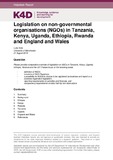| dc.contributor.author | Kelly, Luke | |
| dc.coverage.spatial | Tanzania | en |
| dc.coverage.spatial | Kenya | en |
| dc.coverage.spatial | Uganda | en |
| dc.coverage.spatial | Ethiopia | en |
| dc.coverage.spatial | Rwanda | en |
| dc.coverage.spatial | England | en |
| dc.coverage.spatial | Wales | en |
| dc.date.accessioned | 2019-09-26T09:23:41Z | |
| dc.date.available | 2019-09-26T09:23:41Z | |
| dc.date.issued | 2019-08-21 | |
| dc.identifier.citation | Kelly, L. (2019). Legislation on non-governmental organisations (NGOs) in Tanzania, Kenya, Uganda, Ethiopia, Rwanda and England and Wales. K4D Helpdesk Report. Brighton, UK: Institute of Development Studies. | en |
| dc.identifier.uri | https://opendocs.ids.ac.uk/opendocs/handle/20.500.12413/14710 | |
| dc.description.abstract | This literature review finds evidence of several regulatory requirements for non-governmental organisation (NGO) formation and work in Ethiopia, Kenya, Rwanda, Tanzania, Uganda and England and Wales. Laws have made it mandatory, or more difficult, to register NGOs, and have imposed more stringent reporting requirements in most of the countries surveyed. In Ethiopia and Kenya, however, moves have been made to ease restrictions on NGOs but have yet to be fully implemented. In some countries such as Kenya, England and Wales, and Uganda, NGOs can register under non-profit company legislation. However, this will usually exclude them from the tax benefits of registration as an NGO or public benefit organisation (PBO) and will subject them to other regulation. NGOs are defined differently in each country’s law, with regards to the type of activity they may undertake and their source of income, among other things. This report uses a broad definition of NGOs as non-governmental organisations working for a charitable purpose. It therefore includes what may in some countries be called a charity, a civil society organisation (CSO) or a public benefit organisation (PBO). NGOs may be both national (meaning based in the country being discussed) or international (usually based in a developed country). The report notes how each country distinguishes between different organisations based on their funding source, activities or legal personality. For consistency the report uses NGO as a catch-all term to describe these different forms of charitable organisation when not describing specific organisational forms within a country. This review is based on published versions of legislation pertaining to NGOs. It uses reports on these laws by think tanks and NGOs to provide interpretations of the effect, or likely effect, of this legislation. Some changes in legislation have been very recent, and it is not possible to ascertain their effect on NGOs. In some cases, such as Kenya, legislation is pending, so this review has 3 included discussion of both the current and pending legislation. As well as the five African countries mentioned, the review also discusses charity law in England and Wales for comparison. | en |
| dc.language.iso | en | en |
| dc.publisher | IDS | en |
| dc.relation.ispartofseries | K4D Helpdesk Report;656 | |
| dc.rights.uri | https://www.nationalarchives.gov.uk/doc/open-government-licence/version/3/ | en |
| dc.subject | Aid | en |
| dc.subject | Governance | en |
| dc.subject | Rights | en |
| dc.title | Legislation on Non-Governmental Organisations (NGOs) in Tanzania, Kenya, Uganda, Ethiopia, Rwanda and England and Wales | en |
| dc.type | Helpdesk | en |
| dc.rights.holder | © DFID - Crown copyright 2019 | en |
| dcterms.dateAccepted | 2019-08-21 | |
| rioxxterms.funder | Department for International Development, UK Government | en |
| rioxxterms.identifier.project | K4D | en |
| rioxxterms.version | VoR | en |
| rioxxterms.funder.project | 238a9fa4-fe4a-4380-996b-995f33607ba0 | en |

